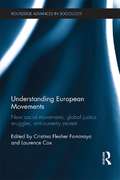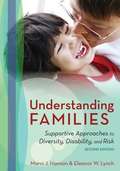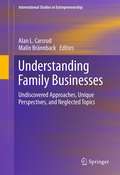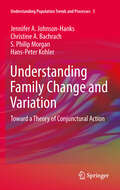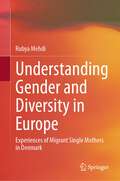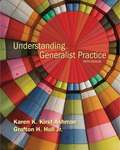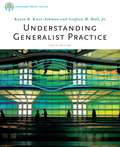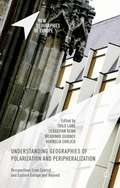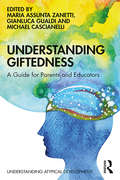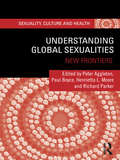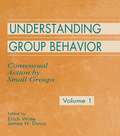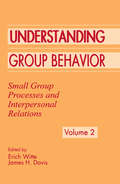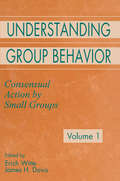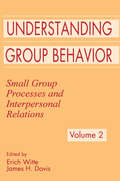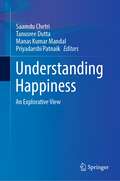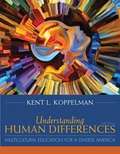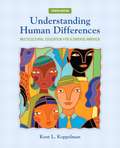- Table View
- List View
Understanding European Movements: New Social Movements, Global Justice Struggles, Anti-Austerity Protest (Routledge Advances in Sociology)
by Laurence Cox Cristina Flesher FominayaEuropean social movements have been central to European history, politics, society and culture, and have had a global reach and impact. Yet they have rarely been taken on their own terms in the English-language literature, considered rather as counterpoints to the US experience. This has been exacerbated by the failure of Anglophone social movement theorists to pay attention to the substantial literatures in languages such as French, German, Spanish or Italian – and by the increasing global dominance of English in the production of news and other forms of media. This book sets out to take the European social movement experience seriously on its own terms, including: the European tradition of social movement theorising – particularly in its attempt to understand movement development from the 1960s onwards the extent to which European movements between 1968 and 1999 became precursors for the contemporary anti-globalisation movement the construction of the anti-capitalist "movement of movements" within the European setting the new anti-austerity protests in Iceland, Greece, Spain (15-M/Indignados), and elsewhere. This book offers a comprehensive, interdisciplinary perspective on the key European social movements in the past forty years. It will be of interest for students and scholars of politics and international relations, sociology, history, European studies and social theory.
Understanding Families: Supportive Approaches to Diversity, Disability, and Risk
by Eleanor W. Lynch Marci J. HansonThis book is about families in their many forms, their strengths and challenges, and the ways in which human service professionals can extend their effectiveness by working in partnership with families. This book is based on the authors' beliefs about families and the essential role that family members play in intervention. The textbook is a comprehensive guide to working effectively and respectfully with contemporary families.
Understanding Family Businesses
by Malin Brännback Alan CarsrudBusinesses owned and operated by families constitute the vast majority of firms around the world. These firms are found in all industrial segments, from retail and service establishments to heavy manufacturers. Their sizes and revenues range from the smallest venture of a husband and wife roadside food stall in rural India to the largest multinational, highly diversified corporations in the United States and Europe. Many challenges, such as competition, regulation, environmental concerns, access to capital, and macroeconomic factors confront family and nonfamily firms alike. In addition, family and closely-held firms grapple with such issues of succession, continuity, conflict resolution, identity and organizational roles, estate and financial planning that are idiosyncratic to them; when psychological, social, and emotional factors are in play, constantly changing familial relationships influence the strategic and financial choices they make. Yet, there has been comparatively little theoretical or empirical research undertaken on family firms, relative to entrepreneurship and strategic management. This book addresses gaps in the literature by presenting a holistic, multi-disciplinary approach to the study and practice of family business that draws from such fields as psychology, anthropology, sociology, strategy, family therapy, family studies, wealth management, and international business. An international array of experts addresses both macro issues (including the role of family businesses in new business creation and economic development, influences of culture on family business, public policies that can encourage or threaten family business) and firm management (strategic and financial decision making, governance, entering and exiting). Featuring case studies from firms in a variety of industries, Understanding Family Businesses not only offers provocative new insights on family business dynamics, but outlines an agenda for future research.
Understanding Family Change and Variation
by Hans-Peter Kohler Pamela Smock Christine A. Bachrach Lynette Hoelter S. Philip Morgan Rosalind King Jennifer A. Johnson-HanksFertility rates vary considerably across and within societies, and over time. Over the last three decades, social demographers have made remarkable progress in documenting these axes of variation, but theoretical models to explain family change and variation have lagged behind. At the same time, our sister disciplines--from cultural anthropology to social psychology to cognitive science and beyond--have made dramatic strides in understanding how social action works, and how bodies, brains, cultural contexts, and structural conditions are coordinated in that process. Understanding Family Change and Variation: Toward a Theory of Conjunctural Action argues that social demography must be reintegrated into the core of theory and research about the processes and mechanisms of social action, and proposes a framework through which that reintegration can occur. This framework posits that material and schematic structures profoundly shape the occurrence, frequency, and context of the vital events that constitute the object of social demography. Fertility and family behaviors are best understood as a function not just of individual traits, but of the structured contexts in which behavior occurs. This approach upends many assumptions in social demography, encouraging demographers to embrace the endogeneity of social life and to move beyond fruitless debates of structure versus culture, of agency versus structure, or of biology versus society.
Understanding Gender and Diversity in Europe: Experiences of Migrant Single Mothers in Denmark
by Rubya MehdiThis book is a socio-legal interdisciplinary study on gender and diversity in multicultural societies of Europe. It uses secondary data to discuss the broad experiences of migrant single mothers/women in Europe. Second, it includes narratives of experiences across the life course of single Danish-Pakistani women, starting from their pre-migration background to their elderly lives. The author uses an analytical framework used of relational collectivism and individualism, the former referring to the understanding of oneself as connected and interdependent to the family, and the latter referring to values of independence, personal interest and achievements. She uses the term “mélange familism” to explain a new family type that combines both relational-collectivist and individualist elements. A major part of this work is its deliberation of mélange familism and processes of social and legal practices in the everyday lives of single mothers. Crucially, the book demonstrates that social and legal traditions are not static, but are a product of improvisation. It makes a significant contribution by providing an alternate picture of single women/mothers as against the stereotypical image of ‘passive, subordinate Muslim women’. It also contributes to gender and family studies by showing the increasing establishment of single-mother-headed households as a source of new possibilities; a new type or form of family construction, and not just the tragic residue of a broken two-parent family.
Understanding Generalist Practice (5th edition)
by Karen K. Kirst-Ashman Grafton H. HullNew edition of a text that provides a framework for social work students to view the world from a generalist perspective. Emphasizing a core of micro-skills, Kirst-Ashman (U. of Wisconsin-Whitewater) and Hull (U. of Utah) present 16 chapters that discuss relationship-building, interviewing, and problem-solving abilities necessary for working with individual clients. They also orient students to think not only in terms of individual needs but also of group and community needs. New focus points include cultural competency, empowerment of people with disabilities, interviewing children in the context of abuse, updated information on substance abuse, and confidentiality with respect to electronic record-keeping. Annotation c. Book News, Inc., Portland, OR (booknews.com)
Understanding Generalist Practice (Mindtap Course List Series)
by Karen K. Kirst-Ashman Grafton H. HullOrganized around the coherent and cohesive Generalist Intervention Model, this guide to generalist social work practice incorporates the knowledge, skills, and professional values you need to work with individuals and families, as well as the foundation to work with groups, communities, and organizations. Updated to reflect current topics and practice, the book focuses on micro levels of social work practice while also discussing the interrelationship among the micro, mezzo, and macro levels. Part of the Brooks/Cole Empowerment Series, UNDERSTANDING GENERALIST PRACTICE, 8th Edition, clearly identifies content related to the latest Council on Social Work Education (CSWE) Educational Policy and Accreditation Standards (EPAS) with icons throughout the text. Learning objectives, which are correlated to chapter headings and summaries, guide your reading and reinforce your understanding.
Understanding Generalist Practice (Sixth Edition)
by Karen K. Kirst-Ashman Grafton H. Hull Jr.Organized around the authors' coherent and cohesive Generalist Intervention Model, this introductory guide to generalist social work practice provides users with the knowledge and skills they will need to work with individuals and families, as well as the foundation to work with groups, communities, and organizations. It explores the links between micro, mezzo, and macro levels of social work practice and reflects the latest EPAS standards with empowerment and strengths perspectives for partnering with clients.
Understanding Geographies of Polarization and Peripheralization: Perspectives From Central And Eastern Europe And Beyond (New Geographies Of Europe)
by Thilo Lang Sebastian Henn Wladimir Sgibnev Kornelia EhrlichThis book presents a multifaceted perspective on regional development and corresponding processes of adaptation and response, focusing on the concepts of polarization and peripheralization. It discusses theoretical and empirical foundations and presents several compelling case studies from Central and Eastern Europe and beyond.
Understanding Geographies of Polarization and Peripheralization: Perspectives from Central and Eastern Europe and Beyond (New Geographies of Europe)
by Thilo Lang Sebastian Henn Wladimir Sgibnev Kornelia EhrlichThis book presents a multifaceted perspective on regional development and corresponding processes of adaptation and response, focusing on the concepts of polarization and peripheralization. It discusses theoretical and empirical foundations and presents several compelling case studies from Central and Eastern Europe and beyond.
Understanding Giftedness: A guide for parents and educators (Understanding Atypical Development)
by Gianluca Gualdi Maria Assunta Zanetti Michael CascianelliThis concise, accessible guide explores the different models behind the concept of giftedness, examining the criteria for evaluating and identifying gifted children, in order to provide a deeper understanding of the lives of children and young people with high cognitive potential. It offers practical advice to parents and teachers, highlighting common queries and misconceptions and presenting evidence-based suggestions for management methods. Key topics covered include the difference between being gifted and talented, how to identify a gifted child, neurological differences between gifted children and their peers, dealing with perfectionism, and the best ways to parent and teach a gifted child. Avoiding prescriptive rules, the authors emphasise the importance of knowing and understanding the individual child whilst utilising research around giftedness to promote the best possible outcomes. Illustrated with case studies of student and teacher perspectives, the book offers an inclusive perspective and practical strategies, whereby the development of individual potential is viewed not only as a way to promote the psychological well-being of the individual but also as an opportunity and benefit for society. Understanding Giftedness is essential reading for parents and caregivers, as well as practitioners in clinical and educational psychology, counselling, mental health, nursing, child welfare, public healthcare and those in education who want to help young people develop their talents and achieve their full potential.
Understanding Global Political Earthquake: Study of Post-Cold War International Systemic Transition and Indo-US Relations (Routledge Revivals)
by Manoj SoniPublished in 1998, this text presents two theoretical frameworks for understanding the post-Cold War international systematic transition, and Indo-US relational patterns. The frameworks explain the casual determinants of the current international systematic transition and foreign policy in a comparative perspective. It aims to provide tools not only to gauge the present transition but also to develop warning systems to decipher symptoms of any future international systematic transition of foreign policy behaviour.
Understanding Global Sexualities: New Frontiers (Sexuality, Culture and Health)
by Richard Parker Henrietta L. Moore Peter Aggleton Paul BoyceOver the course of the past thirty years, there has been an explosion of work on sexuality, both conceptually and methodologically. From a relatively limited, specialist field, the study of sexuality has expanded across a wide range of social sciences. Yet as the field has grown, it has become apparent that a number of leading edge critical issues remain. This theory-building book explores some of the areas in which there is major and continuing debate, for example, about the relationship between sexuality and gender; about the nature and status of heterosexuality; about hetero- and homo-normativity; about the influence and intersection of class, race, age and other factors in sexual trajectories, identities and lifestyles; and about how best to understand the new forms of sexuality that are emerging in both rich world and developing world contexts. With contributions from leading and new scholars and activists from across the globe, this book highlights tensions or ‘flash-points’ in contemporary debate, and offers some innovative ways forward in terms of thinking about sexuality – both theoretically and with respect to policy and programme development. An extended essay by Henrietta Moore introduces the volume, and an afterword by Jeffrey Weeks offers pointers for the future. The contributors bring together a range of experiences and a variety of disciplinary perspectives in engaging with three key themes of sexual subjectivity and global transformations, sexualities in practice, and advancing new thinking on sexuality in policy and programmatic contexts. It is of interest to students, researchers and activists in sexuality, sexual health and gender studies, especially those working from public health, sociological and anthropological perspectives.
Understanding Global Sexualities: New Frontiers (Sexuality, Culture and Health)
by Richard Parker Henrietta L. Moore Peter Aggleton Paul BoyceOver the course of the past thirty years, there has been an explosion of work on sexuality, both conceptually and methodologically. From a relatively limited, specialist field, the study of sexuality has expanded across a wide range of social sciences. Yet as the field has grown, it has become apparent that a number of leading edge critical issues remain. This theory-building book explores some of the areas in which there is major and continuing debate, for example, about the relationship between sexuality and gender; about the nature and status of heterosexuality; about hetero- and homo-normativity; about the influence and intersection of class, race, age and other factors in sexual trajectories, identities and lifestyles; and about how best to understand the new forms of sexuality that are emerging in both rich world and developing world contexts. With contributions from leading and new scholars and activists from across the globe, this book highlights tensions or ‘flash-points’ in contemporary debate, and offers some innovative ways forward in terms of thinking about sexuality – both theoretically and with respect to policy and programme development. An extended essay by Henrietta Moore introduces the volume, and an afterword by Jeffrey Weeks offers pointers for the future. The contributors bring together a range of experiences and a variety of disciplinary perspectives in engaging with three key themes of sexual subjectivity and global transformations, sexualities in practice, and advancing new thinking on sexuality in policy and programmatic contexts. It is of interest to students, researchers and activists in sexuality, sexual health and gender studies, especially those working from public health, sociological and anthropological perspectives.
Understanding Group Behavior: Volume 1: Consensual Action By Small Groups
by James H. Davis Erich H. WitteThese books grew out of the perception that a number of important conceptual and theoretical advances in research on small group behavior had developed in recent years, but were scattered in rather fragmentary fashion across a diverse literature. Thus, it seemed useful to encourage the formulation of summary accounts. A conference was held in Hamburg with the aim of not only encouraging such developments, but also encouraging the integration of theoretical approaches where possible. These two volumes are the result. Current research on small groups falls roughly into two moderately broad categories, and this classification is reflected in the two books. Volume I addresses theoretical problems associated with the consensual action of task-oriented small groups, whereas Volume II focuses on interpersonal relations and social processes within such groups. The two volumes differ somewhat in that the conceptual work of Volume I tends to address rather strictly defined problems of consensual action, some approaches tending to the axiomatic, whereas the conceptual work described in Volume II is generally less formal and rather general in focus. However, both volumes represent current conceptual work in small group research and can claim to have achieved the original purpose of up-to-date conceptual summaries of progress on new theoretical work.
Understanding Group Behavior: Volume 1: Consensual Action By Small Groups; Volume 2: Small Group Processes and Interpersonal Relations
by James H. Davis Erich H. WitteThese books grew out of the perception that a number of important conceptual and theoretical advances in research on small group behavior had developed in recent years, but were scattered in rather fragmentary fashion across a diverse literature. Thus, it seemed useful to encourage the formulation of summary accounts. A conference was held in Hamburg with the aim of not only encouraging such developments, but also encouraging the integration of theoretical approaches where possible. These two volumes are the result. Current research on small groups falls roughly into two moderately broad categories, and this classification is reflected in the two books. Volume I addresses theoretical problems associated with the consensual action of task-oriented small groups, whereas Volume II focuses on interpersonal relations and social processes within such groups. The two volumes differ somewhat in that the conceptual work of Volume I tends to address rather strictly defined problems of consensual action, some approaches tending to the axiomatic, whereas the conceptual work described in Volume II is generally less formal and rather general in focus. However, both volumes represent current conceptual work in small group research and can claim to have achieved the original purpose of up-to-date conceptual summaries of progress on new theoretical work.
Understanding Group Behavior: Volume 1: Consensual Action By Small Groups; Volume 2: Small Group Processes and Interpersonal Relations
by James H. Davis Erich H. WitteThese books grew out of the perception that a number of important conceptual and theoretical advances in research on small group behavior had developed in recent years, but were scattered in rather fragmentary fashion across a diverse literature. Thus, it seemed useful to encourage the formulation of summary accounts. A conference was held in Hamburg with the aim of not only encouraging such developments, but also encouraging the integration of theoretical approaches where possible. These two volumes are the result. Current research on small groups falls roughly into two moderately broad categories, and this classification is reflected in the two books. Volume I addresses theoretical problems associated with the consensual action of task-oriented small groups, whereas Volume II focuses on interpersonal relations and social processes within such groups. The two volumes differ somewhat in that the conceptual work of Volume I tends to address rather strictly defined problems of consensual action, some approaches tending to the axiomatic, whereas the conceptual work described in Volume II is generally less formal and rather general in focus. However, both volumes represent current conceptual work in small group research and can claim to have achieved the original purpose of up-to-date conceptual summaries of progress on new theoretical work.
Understanding Group Behavior: Volume 1: Consensual Action By Small Groups; Volume 2: Small Group Processes and Interpersonal Relations
by James H. Davis Erich H. WitteThese books grew out of the perception that a number of important conceptual and theoretical advances in research on small group behavior had developed in recent years, but were scattered in rather fragmentary fashion across a diverse literature. Thus, it seemed useful to encourage the formulation of summary accounts. A conference was held in Hamburg with the aim of not only encouraging such developments, but also encouraging the integration of theoretical approaches where possible. These two volumes are the result. Current research on small groups falls roughly into two moderately broad categories, and this classification is reflected in the two books. Volume I addresses theoretical problems associated with the consensual action of task-oriented small groups, whereas Volume II focuses on interpersonal relations and social processes within such groups. The two volumes differ somewhat in that the conceptual work of Volume I tends to address rather strictly defined problems of consensual action, some approaches tending to the axiomatic, whereas the conceptual work described in Volume II is generally less formal and rather general in focus. However, both volumes represent current conceptual work in small group research and can claim to have achieved the original purpose of up-to-date conceptual summaries of progress on new theoretical work.
Understanding Happiness: An Explorative View
by Tanusree Dutta Manas Kumar Mandal Saamdu Chetri Priyadarshi PatnaikThis book provides a comprehensive and enriching understanding of the construct of happiness from diverse perspectives. It provides readers with an overview of the issues, problems, and challenges related to well-being and happiness. The book is divided into three sections. It brings together researchers and practitioners from various disciplines, including psychology, sociology, and development studies. Each section includes chapters from leading academicians from across the world. The first section helps the reader understand happiness from a neuroscientific perspective and explores the relationship between happiness and subjective well-being. The second section of the book discusses the importance of building personal resources for happiness from a positive psychology point of view. The last section examines the importance of happiness in the workplace and suggests a sustainable development plan for happiness. It is a must-buy book for individuals nurturing critical thought and searching for a quintessential understanding of happiness. It presents a unique contribution to the literature with its multidisciplinary focus on specific topics.
Understanding Hate Crimes: Acts, Motives, Offenders, Victims, and Justice
by Carolyn Turpin-PetrosinoHate crimes and lesser acts of bigotry and intolerance are seen to be constants in today’s world. Since 1990, the federal government has published annual reports on hate crime incidents in the United States. While the reported numbers are disturbing, even more devastating is the impact of these crimes on individuals, communities, and society. This comprehensive textbook can serve as a stand-alone source for instructors and students who study hate crimes and/or other related acts. It invites the reader to consider relevant social mores and practices as well as criminal justice policies as they relate to hate crimes by presenting this subject within a broad context.
Understanding Health Determinants: Explanatory Theories for Social Epidemiology
by Ian McDowellThis book assembles a wide range of explanatory perspectives on social inequalities in health. Everywhere in the world, those with less advantage die younger and suffer more illness than the wealthy. Decades of research have documented this reality and yet we lack a comprehensive understanding of the mechanisms through which social circumstances ultimately influence the biological processes that lead to disease. Explanations have been proposed from various disciplines – economics, psychology, behavioral science, geography, and neuroscience – and each sheds light on parts of the overall process. But very few texts assemble these insights into an overall explanatory paradigm.Through a review of concepts and theories from a wide range of disciplines, the author outlines how these may be woven together to offer a more complete picture of how social influences 'get under the skin' to affect health and disease. As well as understanding individual health, the book assembles explanations for social disparities in health. It concludes with a proposal for a set of explanatory models that cross disciplinary boundaries. Topics explored include:Social Inequalities in HealthExplanation and Causal Models for Social EpidemiologySocial and Economic Theories to Explain Patterns of DiseaseBiological Pathways Linking Social Determinants to HealthTheoretical Models of Health BehaviorWork Environment and HealthSocial Networks, Social Support and HealthPositive Influences on Health: Coping and ControlThe Relationship Between Personality and HealthUnderstanding Health Determinants: Explanatory Theories for Social Epidemiology is a textbook for graduate students in epidemiology, health sciences, health policy, and psychology, as well as social science students who are studying health. It will also be of interest to general readers, and can serve as a reference for researchers in epidemiology and the health sciences who are planning studies of the social determinants of health. The book reviews theories that could be tested in such studies.
Understanding Human Behavior and the Social Environment (Cengage Learning Empowerment Series)
by Charles Zastrow Karen K. Kirst-AshmanZastrow and Kirst-Ashman's UNDERSTANDING HUMAN BEHAVIOR AND THE SOCIAL ENVIRONMENT, 10th Edition looks at the lifespan through the lens of social work theory and practice, covering human development and behavior theories within the context of family, organizational, and community systems. Using a chronological lifespan approach, the book presents separate chapters on biological, psychological, and social impacts at the different lifespan stages with an emphasis on strengths and empowerment. Part of the Brooks/Cole Empowerment Series, this edition is completely up to date and thoroughly integrates the core competencies and recommended practice behaviors outlined in the current Educational Policy and Accreditation Standards (EPAS) set by the Council on Social Work Education (CSWE).
Understanding Human Behavior and the Social Environment (Ninth Edition)
by Charles Zastrow Karen K. Kirst-AshmanZastrow and Kirst-Ashman's UNDERSTANDING HUMAN BEHAVIOR AND THE SOCIAL ENVIRONMENT looks at lifespan through the lens of social work theory and practice, covering human development and behavior theories within the context of family, organizational, and community systems. Using a chronological lifespan approach, the book presents separate chapters on biological, psychological, and social impacts at the different lifespan stages with an emphasis on strengths and empowerment. As part of the Brooks/Cole Empowerment Series, this edition is completely up to date and thoroughly integrates the core competencies and recommended practice behaviors outlined in the 2008 Educational Policy and Accreditation Standards (EPAS) set by the Council on Social Work Education (CSWE).
Understanding Human Differences: Multicultural Education for a Diverse America, 5th Edition
by Kent L. KoppelmanA clear, engaging look at the issues of diversity in 21st Century America, focusing on culture, the individual, and institutions. This popular text uses a stimulating inquiry approach to engage students in discussion and debate around the most critical issues of diversity in America.
Understanding Human Differences: Multicultural Education for a Diverse America, Fourth Edition
by Kent L. KoppelmanIn Understanding Human Differences,readers are introduced to sound research grounded in various behavioral and social sciences while featuring a stimulating inquiry approach to support reflection on issues of critical importance in multicultural education in today’s diverse society. The conceptual framework of the book focuses on three areas: culture, the individual, and institutions. Readers are encouraged to examine individual concerns; understand the cultural/historical contexts; and explore such areas as racism, classism, sexism, heterosexism, and ableism. Included is a focus on changes already achieved or that need to be implemented in schools and other areas of society to create a more just society.
